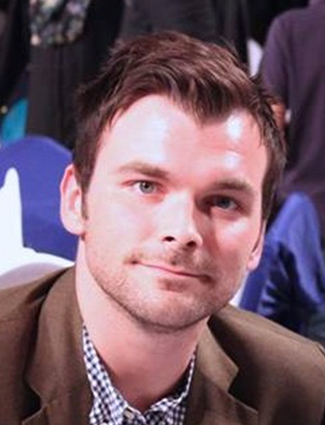University of Cambridge Accepts PhD in LCS Student Into Visiting Scholars Program
Approximately 10 academics per semester are accepted as a Visiting Scholar at University of Cambridge in the United Kingdom. Fall 2017, Pierce Williams will be among those 10.
Williams, a PhD student in Literary and Cultural Studies, applied against dozens of other PhD students and undergraduates and was selected based upon academic merit. Cambridge faculty members select which scholar to work with and agree to advise progress throughout the semester. Williams will travel to Cambridge to attend specialist classes, work with renowned scholars, and explore rare materials in the university's archives.
CMU English recently had a chance to interview Williams about his latest accomplishment.
 What will you be doing as a Visiting Scholar?
What will you be doing as a Visiting Scholar?
I’ll be researching and writing my dissertation in Cambridge for the Fall 2017 semester, and I’ll attend some specialist classes during Michaelmas term, from October through December. I’ll be working in archives when I’m not in class, in the Board of Longitude collections, the Whipple Science Library, and the Newton archives. I’m really interested in printed ephemera like scientific entertainments, workbooks, and cutout paper instruments. People who were excluded from learned institutions most often encountered science through materials like these, and they are not usually digitized because of their awkward shape, size, or poor condition. Having firsthand access will allow me to read through all the ways that lower and middle-class men and women interacted with these objects. There are also a ton of lecture notes and diaries recording the performances of travelling scientific showmen. At the outset of the Enlightenment, these performers were really important for selling science to the general public as a worthwhile and spectacular pursuit. I’ll be reading these thoroughly.
There’s a digital component to my dissertation, as well, that would really benefit from records housed at Cambridge that simply cannot be accessed anywhere else. A few obscure science books in their special collections have records of who bought them bound inside. The Cambridge copies of some of these are literally the only ones left in the world. For good reason, librarians there have been hesitant to haul them out and snap a bunch of pictures of them. A small part of my agenda is to go there and retrieve data from these books in person.
Why did you apply to become a Visiting Scholar at Cambridge?
I applied to Cambridge for a few reasons. They have one of the world’s premier History and Philosophy of Science programs with very deep archives in the history of scientific ideas, the scientific book, and the reception history of science. My dissertation strings together all of these areas, so it was the perfect fit for my research agenda. The biggest draws to Cambridge for me, apart from their archives, are the faculty there working in eighteenth-century science, namely Simon Schaffer and Jim Secord. The scholarship these two in particular have been putting out since the 1980s has, in my opinion, laid foundations that make it possible for my research questions to be taken seriously. My thinking has been enormously shaped by the work coming out of this program, and I’m really excited to have them guiding my progress.
What part of this experience are you most looking forward to?
I’m most excited to work with Simon Schaffer. His Leviathan and the Air-Pump (1985) is required reading (and required citing) if you want to publish in the social or cultural history of science. I was kind of astonished and flattered that he read about my project and took interest in my ideas. He has even been gracious enough to suggest my involvement with an exhibit going up next year at The Science Museum, London, exploring the scientific instrument trades of early modern and eighteenth-century England. Having someone who has had such a huge impact on the trajectory of my field engaged with my dissertation is a real privilege, both professionally and intellectually.
How has your CMU education helped you prepare for this experience?
My dissertation is characterized most by its intersectionality. I’m working with cultural theory, book history, performance studies, and digital humanities methods to think about science as public culture during the Enlightenment. And I’m thinking about all of this in a transatlantic context, across Britain and its North American colonies. When I applied here I think my research proposal was basically that I would read a lot about Benjamin Franklin. Kristina Straub, Jon Klancher, and Chris Warren have really pushed me to look at science through a variety of lenses, and they've embraced the intersectionality of my work. The Cambridge committee that admitted me responded most enthusiastically about the scholarly range that I’ve acquired here, as well as the novel questions I’ve been prepared to ask. CMU’s program made me conscious of the complexities that provoked my research questions, and it has provided the research skills, the guidance and moral support I need to pursue them.
-